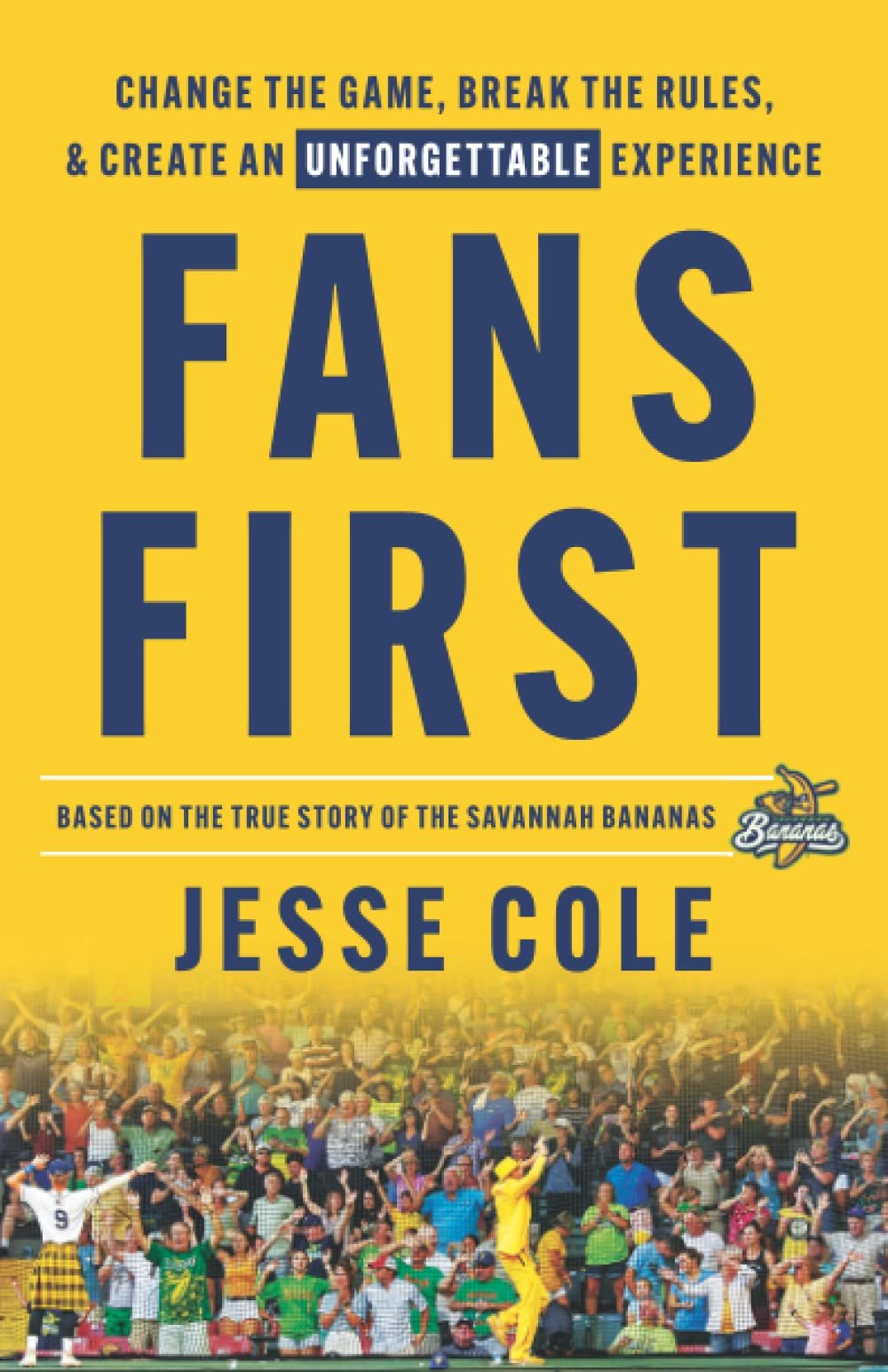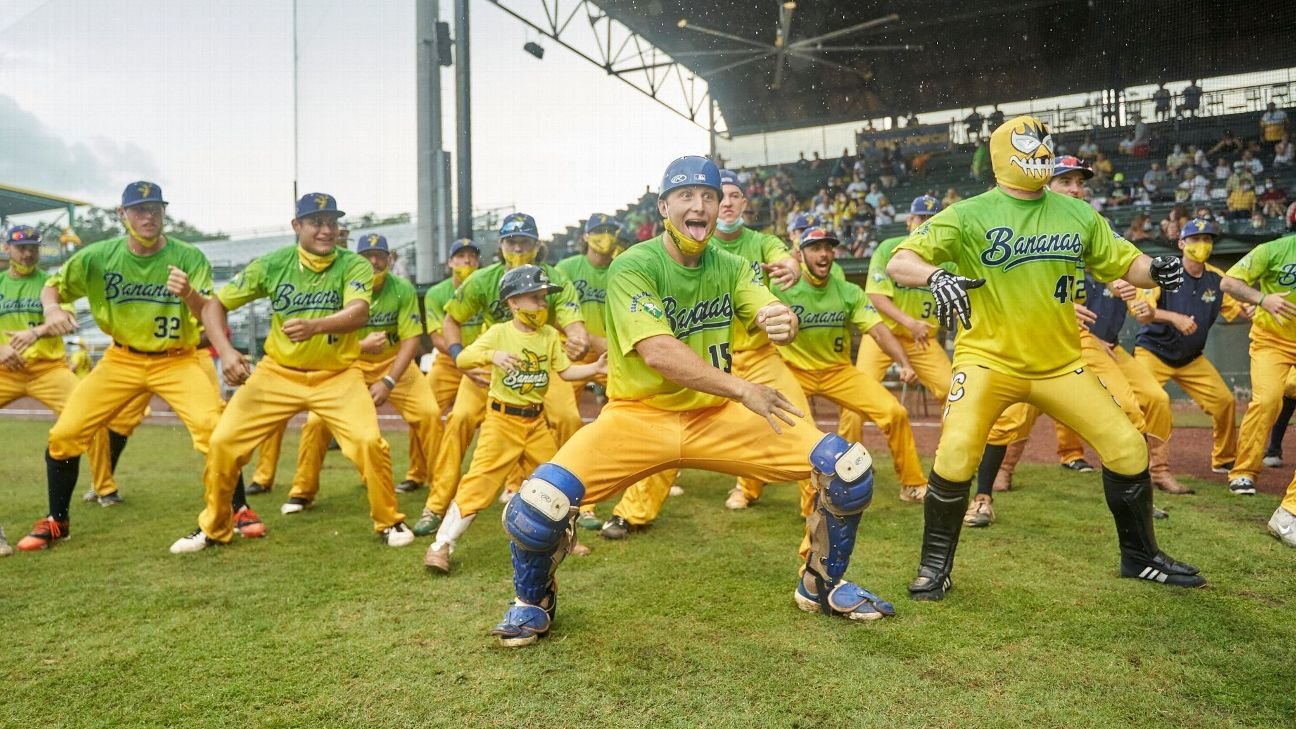Banana Fever! Here are a bunch of takeaways from “Fans First”
Everyone asks themselves what they can do to make their customer or client experience exceptional — frictionless if you will. Jesse Cole, the owner of the Savannah Bananas, has written a great book that explains how he’s done it, how he’s taken a team that played in front of an empty stadium into one that sells out every game.
If Friction Free Communications were a baseball team, we’d aspire to be the Savannah Bananas. I used to work for a company (MBNA America) that would have adopted the team.
The Bananas are getting a lot of exposure – here’s a link to a tremendous 6:59 SportsCenter video on Jesse Cole and the team – and Bananaland, a five-part ESPN+ Original series taking fans behind the scenes of what is arguably baseball’s most innovative (and fun) franchise, premiers Friday, Aug. 19 on ESPN+ and ESPN 2.
Think of this post as a trailer, a reason to buy the book. You can do that here (affiliate link) if I had you at hello.
Banana Ball rules are a bit different. Cole has created an unorthodox version of the game with rules to speed up play and create more action and drama.
Two-hour time limit.
No mound visits.
No bunting.
No walks—just sprints.
Every inning counts.
No stepping out of the batter's box.
Batters can steal first.
Extra-inning showdown (one pitcher, one fielder, and the hitter needs to score).
And my favorite, foul balls caught by fans are outs.
And now, here are 13 takeaways (I started with a list of 39 and Jesse Cole would want me to add something more to the promised dozen):
Constraints foster creativity. If we’d had money pouring in and plenty of resources, we might have been tempted to go with the status quo. With no money, we had to go with the capital we did have: each other. We had to outthink, not outspend. We couldn’t afford to be like every other team—and we were losing by trying to be. We had to go big and go different.
Engineering the Narrative: First, we began coaching our staff on how to respond to the inevitable criticism. We couldn’t control the response, but we could control how we responded to it. We could even have a little bit of fun in the process. Criticism I could handle, but not indifference.
Standing Out. I believe that everyone has something that makes them stand out and be the best version of themselves. Once you find that, the key is to amplify it by ten. That’s your differentiator. That’s your unique ability.
Eliminating Friction. Put yourself in your fans’ shoes and look at every possible pain point, every possible frustration, every possible policy that slows things down, heats up tempers, and punishes fans.
Website Navigation. What happens when you click a link? How easy is it to find the information you want? To buy a product? To find your phone number? Once they find your phone number, what’s the fan experience of calling you?
Fighting Friction. Every team member is always on the lookout for pinch points, from the lines at the concessions stand to the trash on the ground. We look for friction fighters when we’re interviewing new team members by staging trash on the concourse. If the candidate stops to pick it up as we’re walking through the ballpark, then we’ve learned something very important about their character.
Repeat Questions: If you get the same question from multiple people, clearly answer this question by updating the language on your website and any other communication platforms you are using. Go deeper. Listen to the fans’ true interest and provide more details on that. For example, if someone wants to know about handicap parking locations, expand your answer to include the location of ramps in the ballpark, handicap seating options, and wait service for food and drink.
Your Customer Journey. Have you ever listed out all the things you hate about it? Get together with your company’s team and list out all the things you hate about your industry’s primary fan experience. Go to town—no idea is too small. Finally, create a plan of attack. Identify the biggest friction points and have an Ideapalooza on how you’ll work to address them.
Why sweat the failures when we have so many wins to celebrate? Why look down on failure when it often leads to success?
The Value of Experimentation. You either get a win or you get a story. If you like the idea, keep working on it until it comes together. Keep tweaking it until it’s different enough, remarkable enough, or silly enough to work.
Core Values. Most companies have core values, but do they have the stories to back those up? A couple of years after we started, [we] started compiling a storybook of all the Fans First stories that happened during the year. It’s helped us with how we onboard new teammates and coach our people. We’ve learned that stories empower and inspire action more than anything else. What are your fan stories? How are you recording them so you can inspire and appreciate your team?
Storytelling Beats Marketing. To tell a good story, think like a reporter. Define who you are, what you do, how you’re different, what you’re good at, and what you’re all about. Along with the who, what, when, where, and why, think about the meaning of your business as well. What value would someone get out of your message? Why does it matter? Why is it worth sharing?
Plussing. Plussing means giving your fans more than what they paid for, more than what they expect, sometimes even more than it seems reasonable to do. To plus something is to improve it—but not in the normal, boring, “How can we make this a teeny bit better next time?” sense. You can plus every aspect of your business. But you can’t plus every aspect of your business in one day.
“The show doesn’t go on because it’s ready. It goes on because it’s 11:30”
Cole says, “If you were to simplify the Bananas’ process to its essential ingredients, it would all come down to a single question: ‘What if?’ This is the most powerful question I can think of—and it lies at the core of a plussing mindset. ‘What if?’ can turn the most ho-hum, run-of-the-mill experience into something completely new. All you have to do is ask how things could be different.”
If you want to order the book, here’s an Amazon affiliate link to buy it. I’ll make around $.025 if you buy it using this link. Or you can go to your favorite independent bookstore and get it.
Wherever you buy it, I think you’ll enjoy the experience and I think you’ll find some things that help you improve your customer or fan experience.


